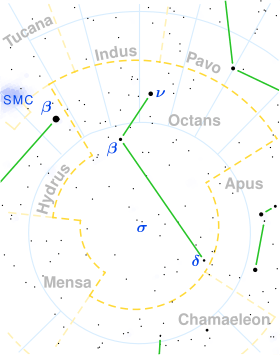Lambda Octantis
| Observation data Epoch J2000 Equinox J2000 | |
|---|---|
| Constellation | Octans |
| Right ascension | 21h 50m 54.56355s[1] |
| Declination | −82° 43′ 08.0450″[1] |
| Apparent magnitude (V) | 5.27[2] |
| Characteristics | |
| Spectral type | G8-K0III[3] |
| U−B color index | +0.47[4] |
| B−V color index | +0.75[4] |
| Astrometry | |
| Radial velocity (Rv) | -10.50[5] km/s |
| Proper motion (μ) | RA: +68.14[1] mas/yr Dec.: -31.86[1] mas/yr |
| Parallax (π) | 7.97 ± 0.45[1] mas |
| Distance | 410 ± 20 ly (125 ± 7 pc) |
| Absolute magnitude (MV) | -0.21[2] |
| Details | |
| Luminosity | 121[2] L☉ |
| Temperature | 5,297[6] K |
| Rotational velocity (v sin i) | 1.8[7] km/s |
| Other designations | |
| Database references | |
| SIMBAD | data |
Lambda Octantis (λ Oct) is a class G8-K0III[3] (yellow giant) star in the constellation Octans. Its apparent magnitude is 5.27[2] and it is approximately 410 light years away based on parallax.[1]
The primary has one companion, B, with stellar type A3, magnitude 7.25, and separation 3.233".[8]
References
- 1 2 3 4 5 6 Van Leeuwen, F. (2007). "Validation of the new Hipparcos reduction". Astronomy and Astrophysics. 474 (2): 653. Bibcode:2007A&A...474..653V. arXiv:0708.1752
 . doi:10.1051/0004-6361:20078357. Vizier catalog entry
. doi:10.1051/0004-6361:20078357. Vizier catalog entry - 1 2 3 4 Anderson, E.; Francis, Ch. (2012). "XHIP: An extended hipparcos compilation". Astronomy Letters. 38 (5): 331. Bibcode:2012AstL...38..331A. arXiv:1108.4971
 . doi:10.1134/S1063773712050015. Vizier catalog entry
. doi:10.1134/S1063773712050015. Vizier catalog entry - 1 2 Hoffleit, D.; Warren, W. H. (1995). "VizieR Online Data Catalog: Bright Star Catalogue, 5th Revised Ed. (Hoffleit+, 1991)". VizieR On-line Data Catalog: V/50. Originally published in: 1964BS....C......0H. 5050. Bibcode:1995yCat.5050....0H.
- 1 2 Mallama, A. (2014). "Sloan Magnitudes for the Brightest Stars". The Journal of the American Association of Variable Star Observers. 42: 443. Bibcode:2014JAVSO..42..443M.Vizier catalog entry
- ↑ Wilson, R. E. (1953). General Catalogue of Stellar Radial Velocities. Carnegie Institution for Science. Bibcode:1953GCRV..C......0W. LCCN 54001336.
- ↑ McDonald, I.; Zijlstra, A. A.; Boyer, M. L. (2012). "Fundamental parameters and infrared excesses of Hipparcos stars". Monthly Notices of the Royal Astronomical Society. 427: 343. Bibcode:2012MNRAS.427..343M. doi:10.1111/j.1365-2966.2012.21873.x. Vizier catalog entry
- ↑ De Medeiros, J. R.; Alves, S.; Udry, S.; Andersen, J.; Nordström, B.; Mayor, M. (2014). "A catalog of rotational and radial velocities for evolved stars". Astronomy & Astrophysics. 561: A126. Bibcode:2014A&A...561A.126D. arXiv:1312.3474
 . doi:10.1051/0004-6361/201220762. Vizier catalog entry
. doi:10.1051/0004-6361/201220762. Vizier catalog entry - ↑ Eggleton, P. P.; Tokovinin, A. A. (2008). "A catalogue of multiplicity among bright stellar systems". Monthly Notices of the Royal Astronomical Society. 389 (2): 869. Bibcode:2008MNRAS.389..869E. arXiv:0806.2878
 . doi:10.1111/j.1365-2966.2008.13596.x. Vizier catalog entry
. doi:10.1111/j.1365-2966.2008.13596.x. Vizier catalog entry
This article is issued from
Wikipedia.
The text is licensed under Creative Commons - Attribution - Sharealike.
Additional terms may apply for the media files.
